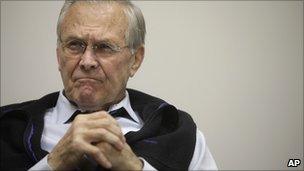US ex-defence head Rumsfeld defends Iraq war handling
- Published

Former US Defence Secretary Donald Rumsfeld remains largely defiant about the Iraq war, saying in a new book that had Saddam Hussein remained in power, the Middle East would be "far more perilous than it is today".
Mr Rumsfeld, 78, has written an autobiography due out next week.
He concedes he could have sent more troops, and that internal US rivalries hampered post-war reconstruction.
Leaked excerpts have been published by the Washington Post and New York Times.
On the question of troops, he says in the 800-page Known and Unknown: "In retrospect, there may have been times when more troops could have helped."
But he says that if senior military officers had reservations about the size of the invading force, they did not inform him.
And as the conflict continued, US commanders, even when asked repeatedly for their views, did not ask him for more troops or disagree with the strategy, he adds.
Conflicting account
Mr Rumsfeld also reveals that President Bush asked him to review the Pentagon's war plans for Iraq just 15 days after the 11 September attacks, an account that appears to conflict with Mr Bush's own version of events.
In an excerpt quoted by the New York Times, Mr Rumsfeld describes how he was summoned to the Oval Office alone and that Mr Bush stressed that he wanted the options on Iraq to be "creative".
In his own recently published memoir, Mr Bush recalls that he made the request some six weeks later.
The BBC's Steve Kingstone, in Washington, says that the memoir reinforces the view that President Bush was already looking ahead to Iraq, even as his administration planned the war against al-Qaeda in Afghanistan.
Although Mr Rumsfeld describes George W Bush as "a far more formidable president than his popular image", he also suggests the former president was at fault for not doing more to resolve disagreements among senior advisers.
Mr Bush "did not always receive, and may not have insisted on, a timely consideration of his options before he made a decision, nor did he always receive effective implementation of the decisions he made", he writes.
"There were far too many hands on the steering wheel," he writes elsewhere; it was "a formula for running the truck into a ditch".
Regrets
He adds he regrets some of the quips he became famous for, such as "stuff happens" about the early looting in post-war Iraq, or his remark about "old Europe" - meaning Germany and France - not supporting the use of force in Iraq.
He also confirms the National Security Council was rife with tensions between the Pentagon and state department, which some critics had blamed on him.
Mr Rumsfeld says his greatest regret was not leaving office immediately after the Abu Ghraib prisoner abuse scandal.
His resignation was refused twice by Mr Bush.
- Published31 August 2010
- Published18 May 2009
- Published8 November 2006